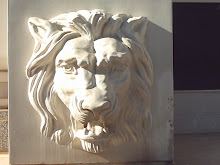Thursday, July 28, 2005
Moroni I prelude
Prelude
The Book of Mormon does not relate the personal events concerning Moroni's youth, upbringing, or familial circumstances. However, we must imagine that his parents taught him faith in Jesus Christ, the necessity of the atonement, and the principle
of repentance, as well as the relationship of these principles to the mosaic law as it was practiced by the Nephites. What has been written about Moroni suggests that his parents instilled in the youth a sense of social responsibility as well as gratitude
to the Lord for his freedom and circumstances. Certainly, Moroni learned about goals and the need to persevere in a work, ignoring the temptation of immediate or temporary gratification offered by
wicked or unchallenging endeavors. He had read, or listened to the reading of the scriptures and had committed some to memory. See Alma 46:23-27. He learned about the sanctity of covenants from his parents' teachings and the words of the prophets. His episodes of righteous anger at the wicked, obstinate adversaries and a slothful government hint at a short temper which may have troubled him as a child. He may have had to overcome a hot temper and intolerance for those slow to comprehend basic truths
or lacking in appreciation. If so, he most assuredly became the master of his emotions as he grew older. He learned obedience for authority and respect for the necessity of a free and democratic form of government.
Moroni also witnessed, and perhaps participated in the conflict instigated by Amlici and his rebel followers. The charismatic Amlici and those who desired to make him a king over the Nephite people had first attempted to seize power through the
ballot box, then by the sword, and finally by resort to the might of foreign armies. Moroni observed and understood this wicked pattern. He also knew of the death and destruction which accompanied such unbridled lust for power. Additionally, Moroni
saw--and may have assisted--as Alma, the prophet of God, head of the church and chief judge of the Nephite people, led the Nephite armies against the dissenters and the Lamanites. Likewise, Moroni was aware that Alma used spies to keep track of enemy
movements. Moroni knew of Alma's personal courage and faith, evidenced as the prophet of God engaged Amlici in personal combat during the midst of battle and called upon the Lord for strength. Alma 2:30. Finally, Moroni witnessed Alma's abdication from the
office of Chief Judge in order to devote his full attention to his calling as High Priest over the church so that he might, without distraction, better work to perfect the Nephite saints.
The teachings of his parents, the Amlicite attack upon the freedoms of his people and the living example of Alma, prophet and stalwart man of God, prepared and shaped Moroni for service to his people as a polished shaft in the quiver of the Lord.
The Book of Mormon does not relate the personal events concerning Moroni's youth, upbringing, or familial circumstances. However, we must imagine that his parents taught him faith in Jesus Christ, the necessity of the atonement, and the principle
of repentance, as well as the relationship of these principles to the mosaic law as it was practiced by the Nephites. What has been written about Moroni suggests that his parents instilled in the youth a sense of social responsibility as well as gratitude
to the Lord for his freedom and circumstances. Certainly, Moroni learned about goals and the need to persevere in a work, ignoring the temptation of immediate or temporary gratification offered by
wicked or unchallenging endeavors. He had read, or listened to the reading of the scriptures and had committed some to memory. See Alma 46:23-27. He learned about the sanctity of covenants from his parents' teachings and the words of the prophets. His episodes of righteous anger at the wicked, obstinate adversaries and a slothful government hint at a short temper which may have troubled him as a child. He may have had to overcome a hot temper and intolerance for those slow to comprehend basic truths
or lacking in appreciation. If so, he most assuredly became the master of his emotions as he grew older. He learned obedience for authority and respect for the necessity of a free and democratic form of government.
Moroni also witnessed, and perhaps participated in the conflict instigated by Amlici and his rebel followers. The charismatic Amlici and those who desired to make him a king over the Nephite people had first attempted to seize power through the
ballot box, then by the sword, and finally by resort to the might of foreign armies. Moroni observed and understood this wicked pattern. He also knew of the death and destruction which accompanied such unbridled lust for power. Additionally, Moroni
saw--and may have assisted--as Alma, the prophet of God, head of the church and chief judge of the Nephite people, led the Nephite armies against the dissenters and the Lamanites. Likewise, Moroni was aware that Alma used spies to keep track of enemy
movements. Moroni knew of Alma's personal courage and faith, evidenced as the prophet of God engaged Amlici in personal combat during the midst of battle and called upon the Lord for strength. Alma 2:30. Finally, Moroni witnessed Alma's abdication from the
office of Chief Judge in order to devote his full attention to his calling as High Priest over the church so that he might, without distraction, better work to perfect the Nephite saints.
The teachings of his parents, the Amlicite attack upon the freedoms of his people and the living example of Alma, prophet and stalwart man of God, prepared and shaped Moroni for service to his people as a polished shaft in the quiver of the Lord.
